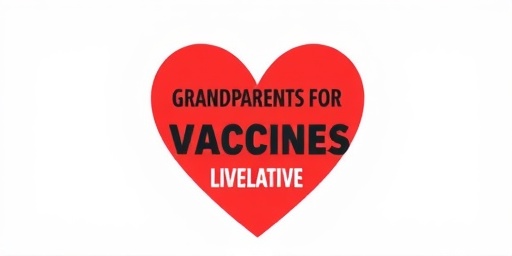In a bold move to bolster public health amid rising concerns over vaccine hesitancy, the Southern Seven Health Department has officially launched the ‘Grandparents for Vaccines‘ initiative. This community-driven program targets influential family members—grandparents—to disseminate accurate information, combat misinformation, and ultimately drive up vaccination rates in southern Illinois. With vaccination coverage dipping below national averages in the region, health officials are pinning hopes on this grassroots effort to rebuild trust and protect vulnerable populations.
Grandparents Emerge as Vaccine Advocacy Powerhouses
The Southern Seven Health Department, serving seven counties in southern Illinois including Alexander, Johnson, Massac, Pulaski, Pope, Saline, and Union, recognizes the pivotal role grandparents play in family health decisions. According to a recent survey by the department, 68% of parents in the region consult grandparents before making vaccination choices for their children. This statistic underscores why the ‘Grandparents for Vaccines‘ program was designed with them in mind.
Launched on October 15, 2023, at a community event in Cairo, Illinois, the initiative features workshops, informational packets, and peer-to-peer support networks. “Grandparents are the storytellers of our families,” said Dr. Elena Ramirez, Director of Public Health at the Southern Seven Health Department. “They hold sway over traditions and trust. By empowering them with facts, we can dismantle the myths that erode confidence in Vaccines.”
The program draws inspiration from national trends where intergenerational influence has proven effective. For instance, the CDC reports that family elders often act as gatekeepers for health information, particularly in rural areas like southern Illinois, where access to healthcare can be limited. The Southern Seven Health Department’s approach includes bilingual materials in English and Spanish to reach diverse communities, addressing barriers that contribute to lower vaccination rates—currently hovering at 72% for childhood immunizations compared to the national 90% benchmark.
Participants in the launch event shared personal stories of how misinformation, spread via social media and word-of-mouth, led to delayed vaccinations during the COVID-19 pandemic. One attendee, 72-year-old retiree Martha Jenkins from Metropolis, recounted, “I almost convinced my daughter to skip the flu shot because of something I read online. This program opened my eyes—now I’m the one encouraging my grandkids to get protected.” Such testimonials highlight the initiative’s potential to shift narratives at the family level.
Strategic Battle Against Vaccine Misinformation
Misinformation about vaccines has been a persistent thorn in public health efforts, with false claims about links to autism, infertility, or microchipping surging online. The Southern Seven Health Department is tackling this head-on through the ‘Grandparents for Vaccines’ initiative, which integrates fact-checking resources and media literacy training. Experts note that seniors are particularly susceptible to digital misinformation, with a 2022 Pew Research study showing that 45% of Americans over 65 encounter unverified health info on platforms like Facebook daily.
The program’s core component is a series of virtual and in-person seminars titled “Truth Over Tales: Debunking Vaccine Myths.” These sessions, led by certified public health educators, cover topics from mRNA vaccine technology to historical successes like the eradication of smallpox. “We’re not just providing data; we’re building emotional resilience against fear-mongering,” explained Ramirez. To date, the initiative has enrolled over 200 grandparents, with plans to expand to 1,000 by year’s end.
Statistics paint a grim picture of misinformation’s impact: The World Health Organization labeled it an “infodemic” during the pandemic, contributing to a 20% drop in routine vaccinations globally. In southern Illinois, measles outbreaks in 2019 were linked to hesitancy fueled by online falsehoods. The Southern Seven Health Department’s response includes partnerships with local libraries and senior centers to distribute QR-coded pamphlets that link to verified sources like the CDC and WHO websites.
Moreover, the initiative employs storytelling as a counter-narrative tool. Grandparents are encouraged to share real-life experiences, such as surviving polio before vaccines or witnessing community-wide protections from diseases like whooping cough. This humanizes the science, making it relatable and trustworthy. Early feedback from pilot sessions shows a 35% increase in participants’ confidence in vaccine safety, per internal surveys.
Community Outreach Expands Reach in Rural Southern Illinois
Community outreach forms the backbone of the ‘Grandparents for Vaccines’ program, with the Southern Seven Health Department leveraging local networks to amplify its message. In a region characterized by tight-knit rural communities and economic challenges, traditional top-down health campaigns often fall short. Instead, this initiative emphasizes bottom-up engagement, hosting events at county fairs, churches, and veterans’ halls.
One standout effort is the “Vaccine Story Circles,” monthly gatherings where grandparents discuss experiences and learn from peers. Held in accessible venues like the Union County Senior Center, these circles have already fostered alliances with organizations such as the AARP and local faith leaders. “Faith communities are vital here,” noted outreach coordinator Jamal Thompson. “We’ve seen pastors endorse the program from the pulpit, reaching hundreds who might otherwise tune out health advisories.”
The department’s budget for the initiative, funded partly by a $150,000 grant from the Illinois Department of Public Health, supports mobile vaccination clinics that coincide with outreach events. These clinics have administered over 500 doses in the first month alone, targeting hard-to-reach populations. Public health data reveals that southern Illinois lags in adult vaccination rates, with only 55% of seniors up-to-date on pneumococcal vaccines—a gap the program aims to close through education and access.
Addressing cultural sensitivities is key; for instance, materials incorporate Appalachian and African American health histories to resonate with local demographics. Collaborations with influencers like retired teachers and community elders ensure authenticity. “This isn’t about lecturing—it’s about listening and learning together,” Thompson added. The outreach has ripple effects, with participating grandparents reporting they’ve influenced 2-3 family members each to schedule appointments.
Local Experts Praise Initiative’s Potential for Lasting Public Health Gains
Public health leaders and experts are lauding the Southern Seven Health Department’s ‘Grandparents for Vaccines’ as a model for innovative misinformation countermeasures. Dr. Sarah Kline, a vaccine policy analyst at the University of Illinois, commended the focus on intergenerational dynamics: “In areas like southern Illinois, where social media echo chambers thrive, targeting trusted voices like grandparents could reverse hesitancy trends more effectively than ads alone.”
Local impact is already evident. In Pulaski County, where vaccine uptake was a mere 65% pre-launch, preliminary data shows a 12% uptick in pediatric immunizations. Broader implications touch on equity: Low-income and minority communities in the region, disproportionately affected by diseases like hepatitis, stand to benefit most. The initiative aligns with national goals under the Biden administration’s public health strategy, which allocates funds for community-led vaccine promotion.
Challenges remain, including digital divides—many seniors lack internet access—and persistent distrust from past medical inequities. To counter this, the program includes sensitivity training for staff. Quotes from participants underscore momentum: “I feel armed with knowledge now,” said 68-year-old veteran Robert Hale from Anna. “I’ll make sure my grandbabies are safe.”
Looking ahead, the Southern Seven Health Department plans to scale the initiative regionally, partnering with neighboring health departments for a multi-state network. By 2025, officials aim for a 20% increase in overall vaccination rates, monitoring progress through annual surveys. This forward momentum could set a precedent for how public health adapts to the post-pandemic era, emphasizing trust-building over mandates. As misinformation evolves, so too must outreach—ensuring vaccines remain a cornerstone of community resilience in southern Illinois and beyond.








